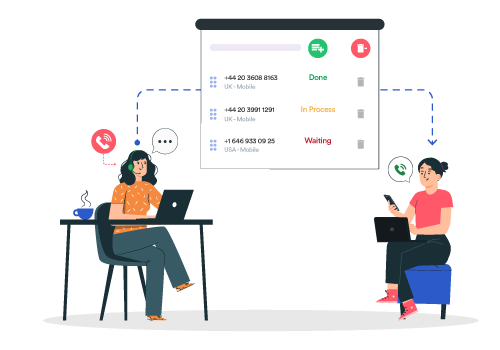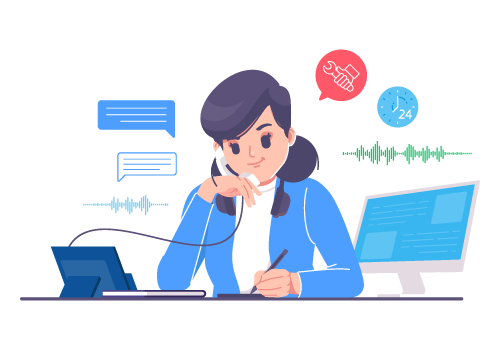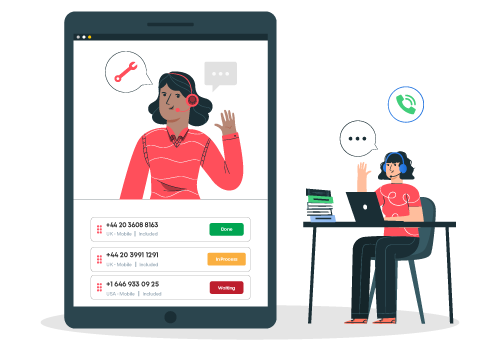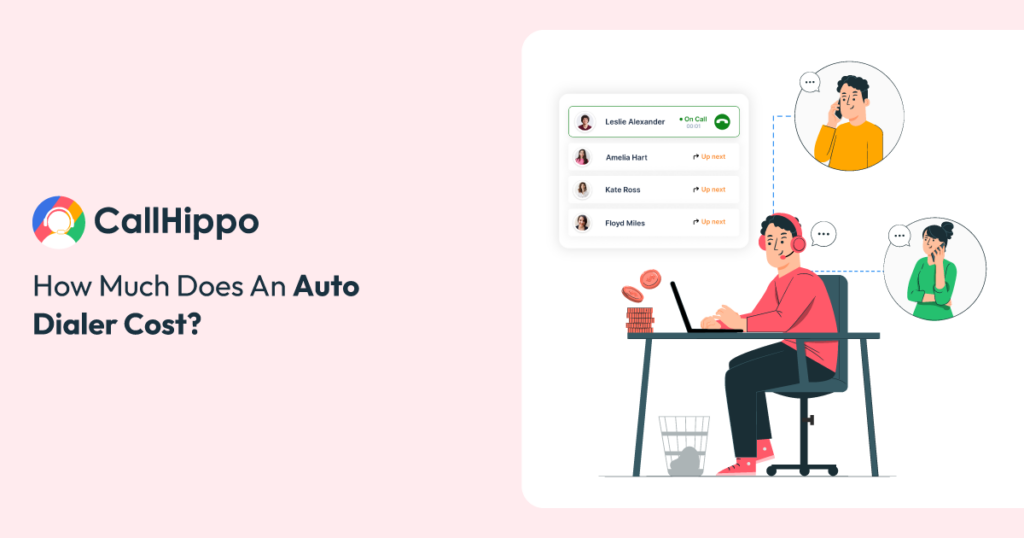Auto Dialer Software & Solutions for Contact Centers
With CallHippo, you can get an auto dialer and have it up and running in less than 3 minutes from anywhere in the world. Powered by robust features, CallHippo’s powerful commercial phone system is one of the most comprehensive solutions for all your business communication needs.

What Is Auto Dialer?
Simply put, an auto dialer is a cloud based software that automatically dials a phone number and initiates a call as soon as the current phone call is over. When the customer support agent or operator concludes the ongoing call, this telephone technology will dial the next phone numbers on the contact list or in the queue. This is where you can bid adieu to manual dialing and the errors that follow with it.
Benefits of an Auto Dialer Software
The ultimate goal of the auto dialer system is to reduce idle time and boost productivity. Besides auto dialing, the technology enables workforce management, quality management and streamlines processes.
Auto dialer will call by itself and your agents won’t need to manually dial their next lead’s number.
When the dialing process is taken care of, you can clearly save time.
Using a auto dialer, your sales representatives will be able to drive more pipeline and drastically increase sales conversions.
Auto dialer software for lead management can organize lead and sales information, customer history, and contact data.
Since agents have access to detailed customer data and use the best-predetermined call strategy for each customer, all customers benefit from personalized experiences that lead to greater long-term loyalty.
You can work to improve the overall efficiency of your sales team or provide extra training to salespeople who need some extra guidance when you can view a detailed history of how your team performs.

How to Set Up an Auto Dialer Software?
Setting up an auto dialer can help streamline your outreach. Here’s a quick guide:
- Log in to Your Account: Access your auto dialer software dashboard with your credentials.
- Access the Auto Dialer Feature: Navigate to the ‘Features’ tab and select the automatic dialer option.
- Upload Your Call List: Upload a CSV file with phone numbers, ensuring compliance with the DNC list.
- Set Calling Rules: Define call intervals, hours, and retry attempts based on your campaign needs.
- Record or Upload a Message: Add your pre-recorded message, ensuring it follows regulations.
- Activate the Auto Dialer: Start the system and monitor campaign progress with real-time analytics.
How Does an Auto Dialer Work?
An auto dialer optimizes the calling process by automating the dialing of phone numbers for agents. Here’s how it functions:
- Required Hardware: Agents need a computer with internet access and a headset for communication.
- Software Setup: Install the auto dialer software on the computer. Most systems are cloud-based, minimizing the need for additional on-site hardware.
- Prepare Call List: Upload a list of phone numbers (usually in CSV format) to the software for dialing.
- Automatic Dialing: The software automatically dials numbers from the list, making multiple calls at once based on the number of available agents and campaign preferences.
- Call Management: Using algorithms, the system predicts when agents will be free, ensuring calls are efficiently managed to minimize downtime.
- Handling Busy Signals & No Answers: If there’s a busy signal or no answer, the system retries the call after a set interval or moves on to the next number.
- Call Routing: When a call is answered, it’s routed to an available agent. If no agents are free, the caller may be placed in a queue.
Types of Auto Dialers: When To Use Each?
Different types of auto dialers are designed to meet specific campaign needs, optimizing call operations based on volume, agent availability, and customer interaction requirements. Here’s when to use each type:
Ideal for high-volume call centers where efficiency is key. It maximizes agent productivity by dialing multiple numbers ahead of time, reducing idle time.
This dialer works best when the focus is on handling a large number of calls quickly and efficiently, prioritizing lead management, and reducing manpower costs.
2. Power Dialer
Best for campaigns where personalized interactions are necessary, such as follow-ups or targeted marketing. It automatically calls one contact at a time, ensuring a steady flow of calls without overwhelming agents.
This dialer is perfect when quality interactions and customer engagement are more important than sheer volume.
A balanced option for campaigns requiring a mix of speed and personalization. It adjusts the dialing pace based on agent availability, minimizing dropped calls and ensuring a smooth workflow.
Ideal for campaigns that need a steady call rate without compromising customer experience or compliance.
4. Preview Dialer
Perfect for complex sales or service environments where agents need preparation time before engaging with a customer. This dialer provides agents with detailed information about the next call, allowing them to make informed decisions.
It’s most effective when a customer-centric, well-prepared approach is essential.
Integrate with Your Preferred Apps
Integrate all the necessary tools from the CallHippo App Marketplace to further streamline your communication processes.
Modern Auto Dialer Software Features

Call Monitoring
Call monitoring refers to the process of listening to a representative’s calls with the objective of improving the quality of communication and customer service.

Smart Switch
Multiple telephony providers before placing a call. You can now safely bid adieu to all your call connectivity issues.
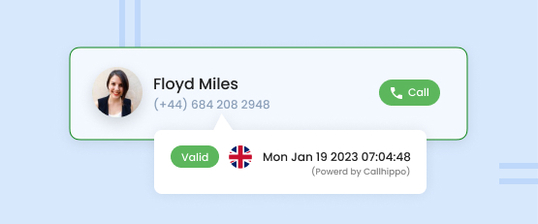
Global Connect
Global Connect helps you know the right time to call your international clients.

Smart Call Forwarding
Each user can choose to have calls forwarded to several phones, to remain reachable even on-the-go.

Call Transfer
The Call Transfer feature allows you to redirect a connected call from your phone number to a team member.
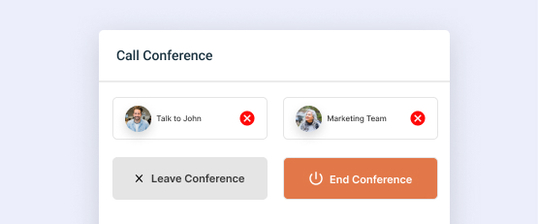
Call Conference
It’s a feature that will enable you to add a third person to your two-way call and turn it into a 3-way conference.

Call Queuing Software
A Call Queue places incoming call in a line when the agent is busy attending other customers.
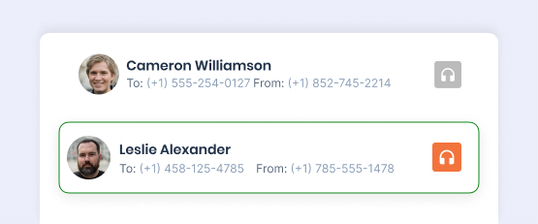
Call Barging
Call Barging is when a supervisor who is silently monitoring the call decides to enter the conference bridge.
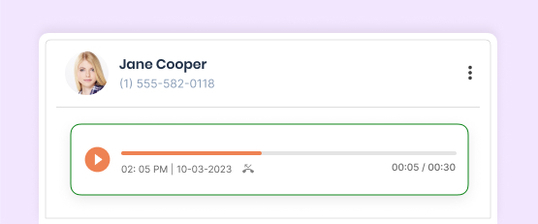
Call Recording
Record call on each of your numbers to better monitor your performance as a team.
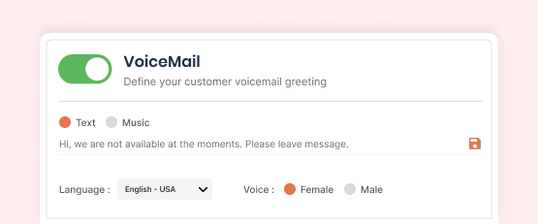
Voice Mail
Receive voicemails by email in your inbox. Play them directly from your email.
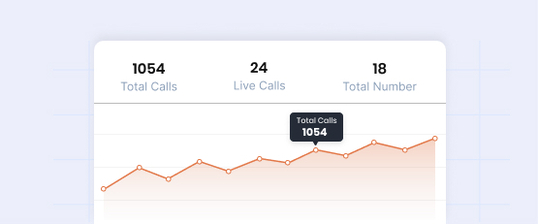
Call Analytics
Track agents performance. Measure the % of missed calls, call load of each teammate, etc.
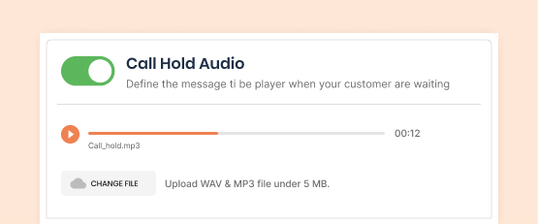
Call Hold Audio
On Hold Music from CallHippo is a great way to keep your callers happy and engaged while on hold or upload your own custom music.
Pricing
- Unlimited Minutes (Includes Both Landline & Mobile Calling)Free minutes are shared by all account users. Calling on special and premium numbers are excluded. For manual calls only.
- 1 Free Phone NumberEach user gets one free phone number. A single number can be assigned to multiple users for making and receiving calls.
- Smart Dashboard
- Paid Call RecordingAdditional charges of $0.005/min are applicable.
- Multiple Integrations
- User Rights
- Chat Support
- Everything in Bronze +
- Unlimited Minutes (Includes Both Landline & Mobile Calling)Free minutes are shared by all account users. Calling on special and premium numbers are excluded. For manual calls only.
- Live Call
- Role-based Access Control
- Free Call Recordings
- Pause-Resume Recording
- After Call Work
- Call Dispositions
- Everything in Silver +
- Unlimited Minutes (Includes Both Landline & Mobile Calling)Free minutes are shared by all account users. Calling on special and premium numbers are excluded. For manual calls only.
- Auto Dialer (Power, Parallel & Speed to Dial)Telephony extra.
- Unlimited QA Users
- Voice Broadcasting
- AI Reports / AnalyticsSmart reports that summarize user & call activity.
- Single Sign On (SSO)Securely log into multiple apps with one set of credentials.
- AI Smart DID Routing
- Hide Number From Agent
- Free Omnichannel Inbox
- Call & SMS Automation
- AI Chat Agents
- AI Workflows
- CSAT Score
- Free Flow Builder
Talk To Us
- Includes all features from past plans
- Minimum 20 Users
- Unlimited calling to 48 countries
- Customized Add-ons for other countries & SMS
- Power Dialer, Parallel Included
- Speech Analytics Or CallHippo AI included
- Priority Support1-hour response time guarantees, designated support team oversight, tailored proactive monitoring and 24/7 support.
- Custom ReportsCustomised reports for tracking teams KPI's.
- Custom OnboardingPersonalised guidance for feature activation and better usage of core CallHippo features.
- Custom data storage and API usage.
- Developer SupportNeed Developer access for support required in software integration.
- Dedicated Account Manager
- Dedicated Compliance SupportTailored assistance from our Legal and Compliance teams to meet specific cybersecurity and documentation needs.
- Unlimited Minutes (Includes Both Landline & Mobile Calling)Free minutes are shared by all account users. Calling on special and premium numbers are excluded.
- 100 SMS (Text Messages)Standard A2P charges apply.
- 1 Free Phone NumberToll-free number not included.
- Basic Report Analytics
- Everything in Starter +
- Unlimited Minutes (Includes Both Landline & Mobile Calling)Free minutes are shared by all account users. Calling on special and premium numbers are excluded.
- 500 SMS (Text Messages)Standard A2P charges apply.
- Call Recordings
- AI Reports / AnalyticsSmart reports that summarize user & call activity.
- Everything in Professional +
- Unlimited Minutes (Includes Both Landline & Mobile Calling)Free minutes are shared by all account users. Calling on special and premium numbers are excluded.
- 1000 SMS (Text Messages)Standard A2P charges apply.
- Dedicated Account Manager
- Custom Integrations
- Single Sign On (SSO)Securely log into multiple apps with one set of credentials.
Talk To Us
- Includes all features from past plans
- Minimum 20 Users
- Unlimited calling to 48 countries
- Customized Add-ons for other countries & SMS
- Power Dialer, Parallel Included
- Speech Analytics Or CallHippo AI included
- Priority Support1-hour response time guarantees, designated support team oversight, tailored proactive monitoring and 24/7 support.
- Custom ReportsCustomised reports for tracking teams KPI's.
- Custom OnboardingPersonalised guidance for feature activation and better usage of core CallHippo features.
- Custom data storage and API usage.
- Developer SupportNeed Developer access for support required in software integration.
- Dedicated Account Manager
- Dedicated Compliance SupportTailored assistance from our Legal and Compliance teams to meet specific cybersecurity and documentation needs.

Discover Crucial Insights With Our Call Analytics.
Start Free TrialFrequently Asked Question
-
Yes, auto dialer is absolutely legal but only if you follow the Federal Communication Commission or TCPA and state regulations.
-
An auto dialer (automatic dialer) is an outbound call center solution that automatically dials the phone numbers on a list. When the call is answered, the auto-dialer either connects the call to the agent or plays the prerecorded message. The auto dialer ensures that only connected calls are transferred to the agent, improving the call-connect ratio.
-
The cost of an auto dialer software varies from provider to provider. The cost is determined by various factors, including integrations, APIs, data privacy, customer support, scalability, etc. Furthermore, some platforms such as CallHippo provide a free auto dialer as part of their business communication system.
-
An auto dialer automates dialing from a list, while a predictive dialer uses algorithms to predict agent availability and dials multiple numbers at once for maximum efficiency.
-
Most automatic dialers have a nearly identical setup process. First, you import the customer phone numbers that you want to dial or are part of your campaign into the auto dialer software. Then, press the dial. This will begin dialing one number at a time for each agent.
-
Some of the critical factors to consider when selecting the right auto dialer software are Third-party software integrations, APIs, data privacy, platform scalability, customer support, and others. Above all, always select an automatic dialer capable of meeting your business objectives.
-
Key benefits include increased productivity, reduced idle time, fewer errors, better lead management, and improved compliance with DNC regulations.
-
The number of calls depends on the software and agent availability. Predictive dialers can handle thousands of calls a day, while power dialers make one call at a time.


